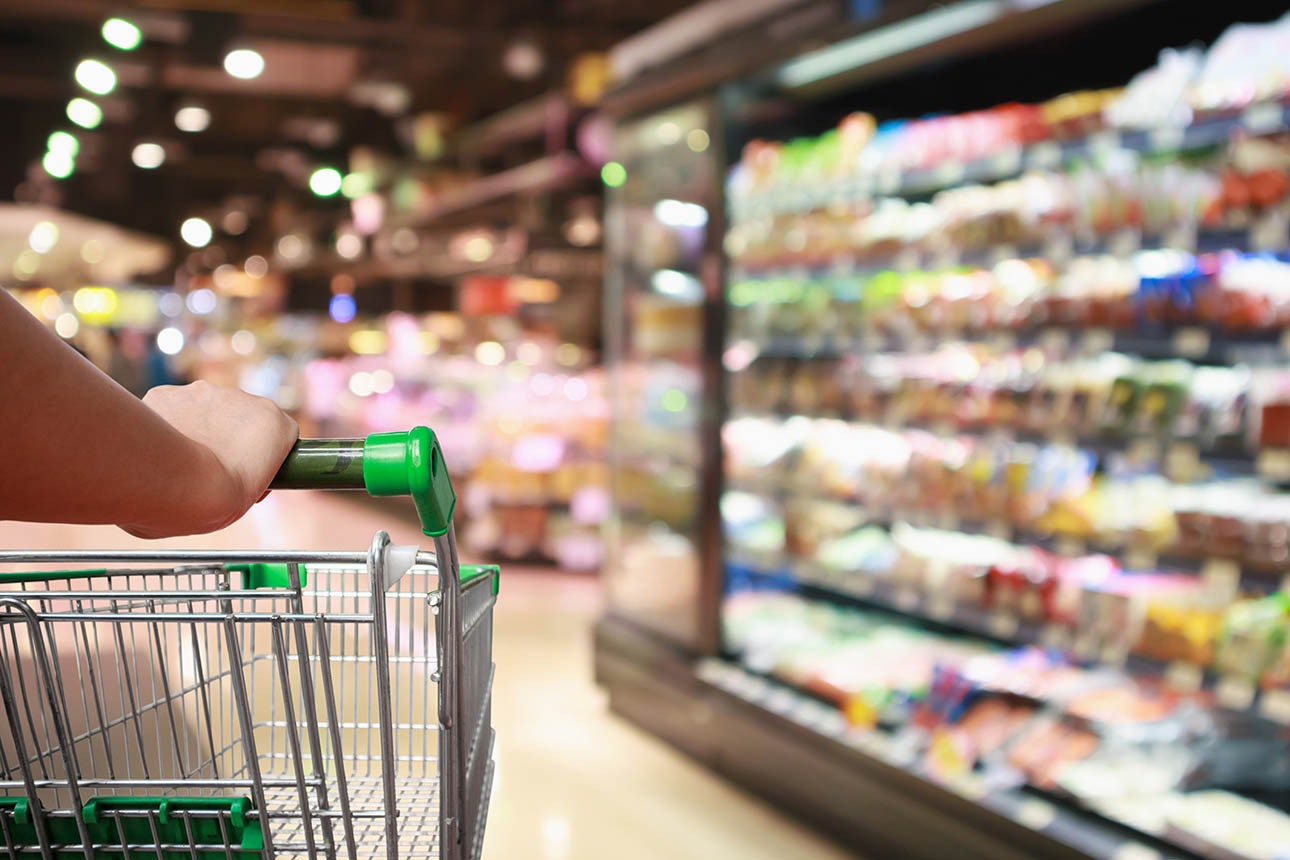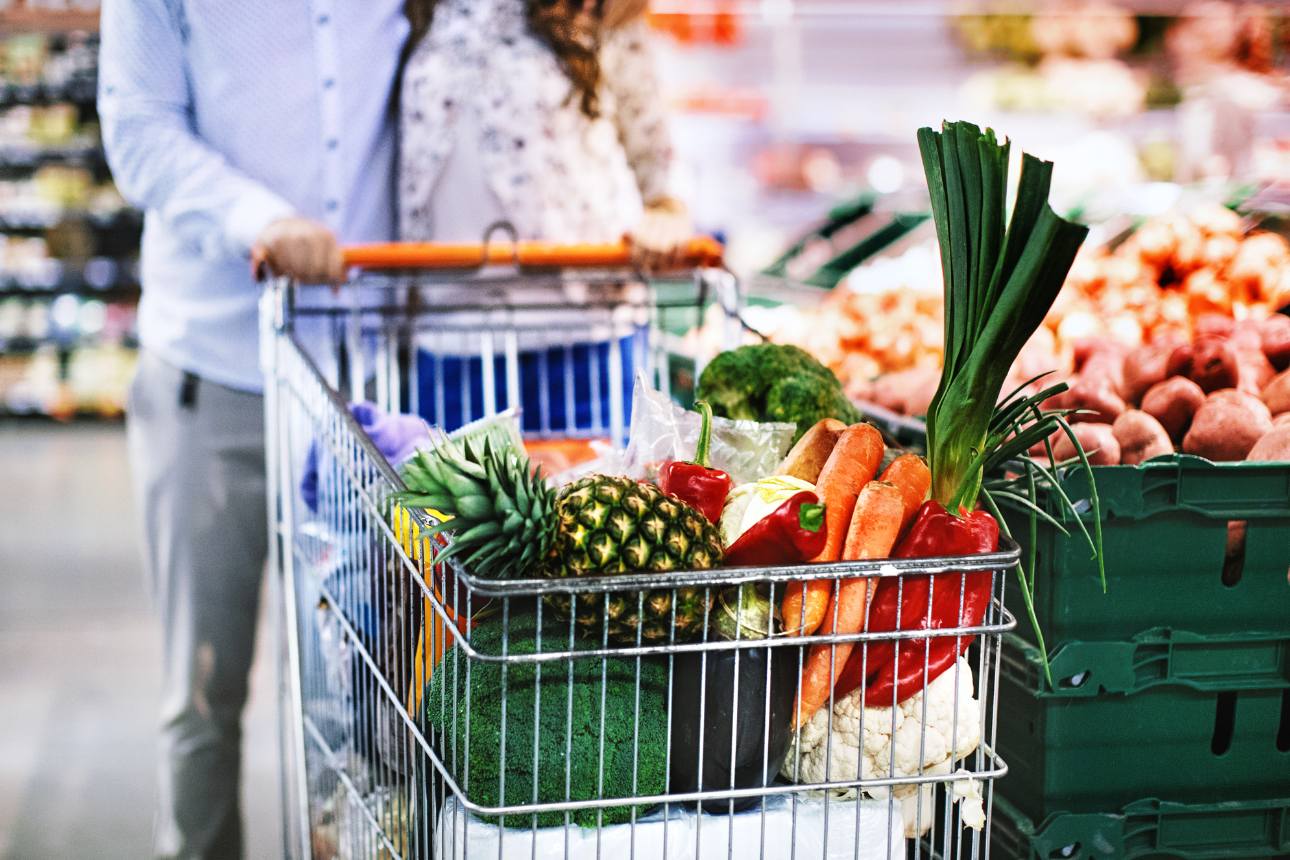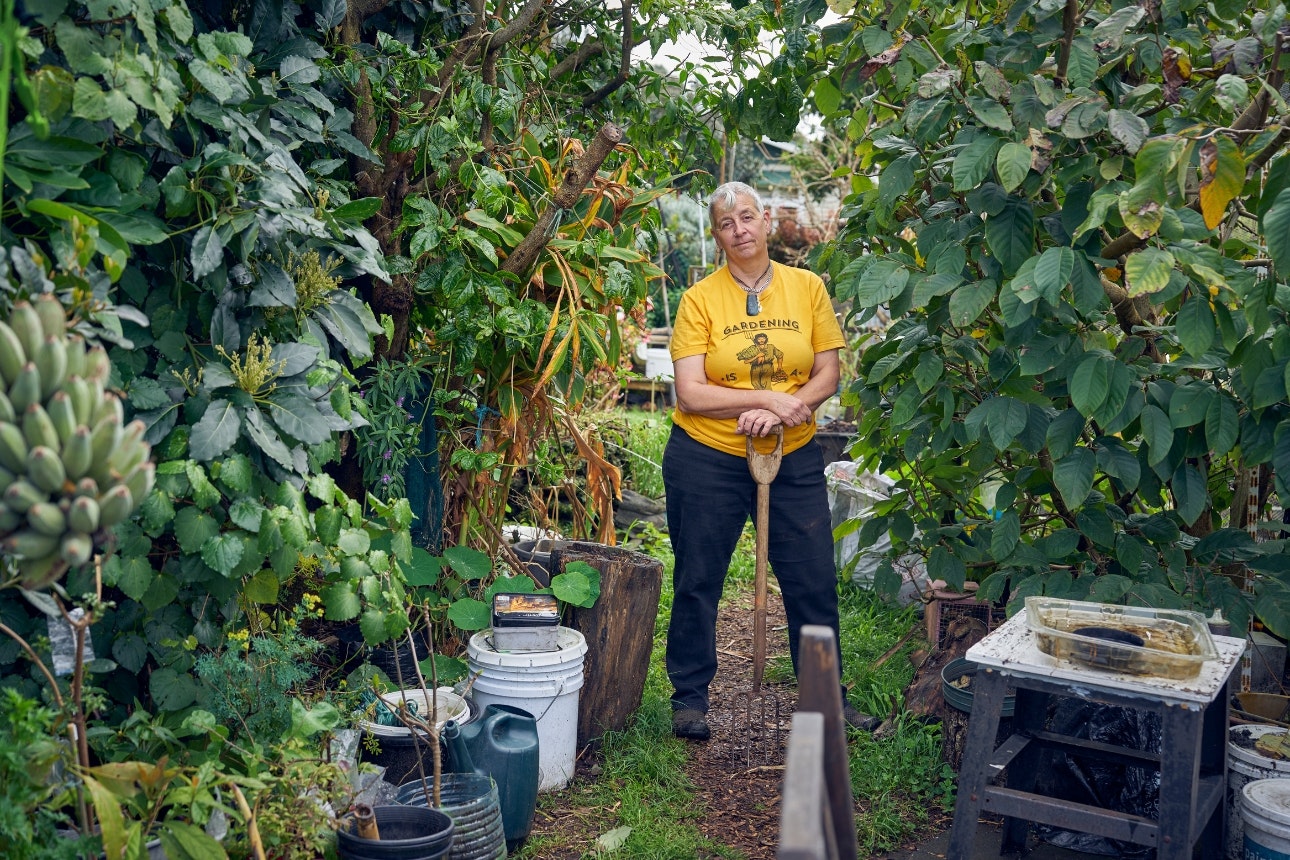
By Rebecca Styles
Research Lead | Hautū Rangahau
Social supermarkets let people access food with dignity during times of need. But is Foodstuffs North Island using them as a public relations exercise, hoping to distract consumers from its own less than ideal practices?
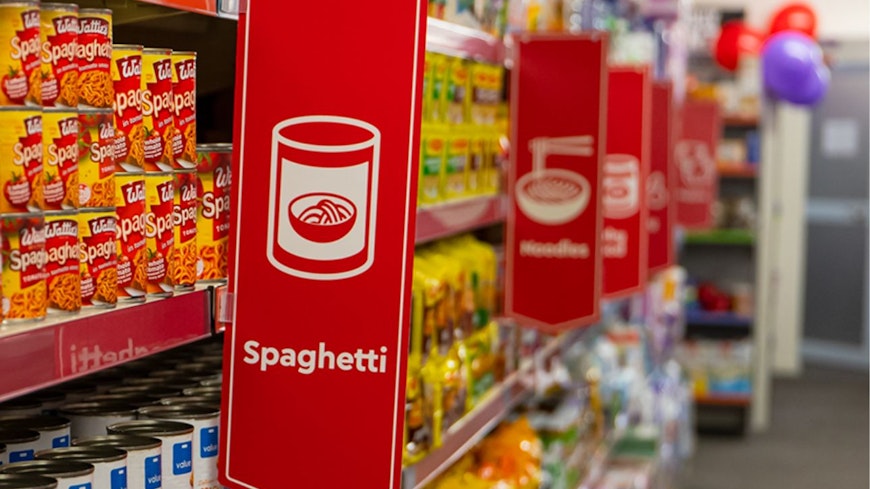
Social supermarket / Wellington City Mission
Cyclists were making their way through Newtown, Wellington down the controversial cycle lane into the city, when I pulled up on the main street. Just before 9am, people were gathering outside the Salvation Army community centre waiting for it to open.
Wellington City Mission’s social supermarket is on a quiet back street, behind the community centre and chapel. The sun peeked between two buildings as I waited outside for Pip, community service director for the mission.
She’d just come out of a meeting and invited me into the store. The clean, bright space is about the size of a Four Square. The shelves are stacked and instead of price tags, there’s a label saying how many points each item is worth.
There’s no cost for the food in the social supermarket. The amount you can shop for is based on a points system, with points allocated based on the size of your family.
As we walked along the aisles, I saw a range of familiar labels, including budget branded staples, along with coffee, muesli, frozen meat and chicken, and some produce – essentially everything you would expect at a mainstream supermarket
A couple of volunteers were also in the supermarket making sure shelves were stocked and ready for the day.
The appointments to shop at the social supermarket weren’t yet booked up for that day, but Pip said they soon would be. Those who can’t wait for the next appointment will be given a food parcel.
Sometimes all people have left to spend on food is $30 for the week, Pip said.
The idea for a social supermarket
Wellington City Mission and Foodstuffs North Island opened the first social supermarket in New Zealand 3 years ago. It heralded a new way for people to access food with dignity, respect and without judgement.
Murray Edridge is the City Missioner and was instrumental in setting the social supermarket up.
“When people came in for food parcels, it was most probably one of the most difficult and stressful periods of their lives, and there was a lot of shame and whakama and stress about asking somebody else for food,” he said.
It got him thinking about how it could be done in a more dignified way. He came across the idea of making the experience as close to a supermarket shopping trip as possible, which meant people would have a choice as to what food they received.
This turned out to be easier said than done, so Edridge looked for help: “if you want a supermarket, you go to somebody who’s got a few, and that happened to be in this case Chris Quin, CEO of Foodstuffs North Island.”
Along with the groceries, Foodstuffs North Island also set-up the stores, train staff, and partner each social supermarket with a buddy store to have an ongoing relationship.
Between them the first social supermarket in Aotearoa was born.
How does a social supermarket work?
Social supermarkets in different communities will all be slightly different. At the Wellington City Mission, people can apply to shop at its social supermarket. You can do this by calling, emailing, or popping into its facility in Newtown, Wellington.
Once you’ve applied, you’ll be given a time slot to come and shop. There’s no cost for the food or to belong to the supermarket. The amount you can shop for depends on how many points you’ve been allocated, which will have been calculated beforehand.
“There can be a lot of emotion in the supermarket. People come in that have never been offered a trolley because they’ve never had enough money to have one,” Edridge said.
The City Mission takes three shoppers each half hour.
“We try to manage the process so it’s a dignified experience for everyone.”
In terms of the range of goods available, it’s very similar to a mainstream supermarket.
Edridge explained the supermarket has 3,000 items, ranging from budget through to premium brands, along with meat, produce and smallgoods. The only things they don’t stock are soft drinks, tobacco or alcohol.
Bread, pet food and feminine hygiene products are all available for zero points.
The items are scanned at the checkout, like they would be at a mainstream supermarket.
For the first three visits, there’s no questions asked. If you become a more regular shopper, “obviously something’s happening in your household that requires you to come to what is an emergency service. So, we get into a conversation about budgets, financial management, about relationships – a whole lot of things that our social work teams or our financial mentoring or health professionals can help with.”
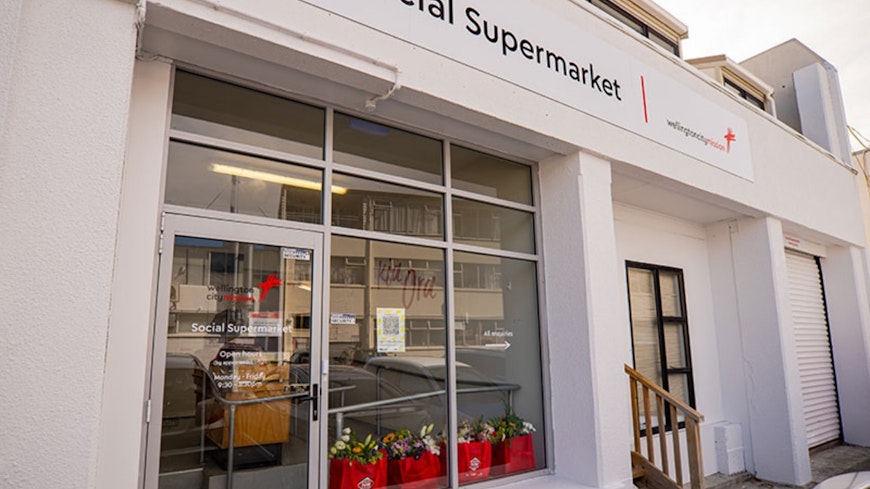
Wellington City Mission Social Supermarket / Foodstuff North Island
Foodstuffs’ sponsorship of social supermarkets
Most of the groceries in the social supermarket are donated by Foodstuffs North Island. Wellington City Mission also buys wholesale goods from Gilmours and bread is donated by New World (both Foodstuffs businesses). It also receives donations from Woolworths.
New social supermarket openings have grabbed a few headlines in recent years. “South Auckland’s first social supermarket opens in Māngere” and “Social supermarket for Whakatāne working poor” are two from this year alone.
In total, Foodstuffs North Island supports 12 social supermarkets, which are promoted as part of its goal to “support every New Zealander to access healthy and affordable food”.
Willa Hand, head of social supermarkets at Foodstuffs North Island, said “there will always be a need for some to access food support outside of regular retail shopping, for a number of reasons, and we believe social supermarkets provide a dignified experience for those who need a bit of help right now.”
Not having enough income is the main driver of food insecurity in Aotearoa. Access to retail stores is also a factor, as well as loss of land and other resources in communities, according to the Salvation Army’s State of the Nation 2024 report.
While Foodstuffs North Island is promoting itself as part of the solution, the question that must be asked is whether it’s also part of the problem.
At present, there’s muted competition in our grocery sector with our two main players holding an 90% market share. When this is taken along with historical excess profits by those players of around $1 million per day and ongoing high food costs, can we take Foodstuffs’ goal seriously?
The cost of food and groceries continues to be the top financial concern for respondents to Consumer NZ’s Sentiment Tracker survey
Food prices have been steadily climbing since 2020. Statistics New Zealand reported in July that food prices had decreased 0.3% in the 12 months to June 2024 – the first annual decrease in nearly 6 years.
Food prices rose drastically from 2020 to 2023 and remain high
Food Price Index, 2020-2024, 2017 Q2 = 1000
Willa Hand told us that a lot of things contribute to food prices.
“Many of them are out of our control – seasonality, weather events, fuel and electricity costs. Supply and demand. We try to keep food as affordable as we can and make sure there are opportunities to access healthy food from other sources when needed.”
She doesn’t agree that competition is muted in the sector.
Poverty is the cause of food insecurity
Tric Malcolm is from Kore Hiakai Zero Hunger Collective, an organisation that works alongside community food organisations while at the same thinking such organisations shouldn’t exist.
“Food insecurity is just a symptom of poverty, and poverty is just a symptom of a broken economic system – it’s a structural issue,” Malcom said.
“A food secure system doesn’t include food banks or social supermarkets or food aid because they help reinforce and keep us in a place where the existence of food insecurity is the reality for a reasonable portion of our population.
“A social supermarket shop is just a food parcel by stealth. It is the equivalent of a food parcel done in a different way, and the dignity wrapped around it is really, really good, but it is just another food relief response. It’s not actually creating food security for anybody because it reinforces dependence on food assistance.”
Food banks and social supermarkets have become part of the answer to food insecurity, yet Edridge also acknowledges they shouldn’t be.
“I’ve seen government food support models that have charitable food distribution as an integral part of the model – it should never be an integral part of the model because it just means we as the community are failing if there needs to be charitable food distribution. But if you’ve got to do it, do it well, and that’s what the supermarket hopefully does.
“Our aspiration is not to exist. In an ideal world we wouldn’t need to be here, but we are, and we need to be here for the moment.”
Is this an exercise in reputation building for the supermarkets?
While Foodstuffs is committing to more social supermarkets, it’s also trying to get a merger of its South and North Island cooperatives approved. The merger has the potential to lessen competition further in the grocery sector, which could further squeeze consumers and suppliers.
Foodstuffs North Island has also recently been slapped with a $3.25 million fine in the Wellington High Court for blocking rivals from setting up nearby. The court action followed a Commerce Commission investigation into historical conduct discovered during the 2022 market study.
Consumers are suspicious about what supermarkets are up to. This is reflected in our Sentiment Tracker data, which shows that since 2021 consumer trust in supermarkets has fallen lower than for any other industry we track.
Professor of marketing analytics at Massey University Bodo Lang said while it is welcome news that supermarkets are supplying social supermarkets, or food banks more generally, there “is a danger of blindly buying into headlines about supermarkets involvement in ‘social supermarkets’”.
There could be another reason behind the supermarkets’ generosity, such as trying to improve their reputation. Professor Lang calls this “reputation laundering”; when a sector uses charitable action to improve its public image despite “other underlying unethical behaviours”.
The Commerce Commission market study into the grocery sector showed New Zealand supermarkets had high profits by international standards, and the scale and pace of their innovation is low. Then there’s the $430 million a year in excess profits for the sector. In that context, Foodstuffs’ actions could well be seen as “reputation laundering”.
“So, while the news of social supermarkets is still welcome, particularly by those who will need to utilise the supermarkets, its impact is somewhat dulled because of their high profit margins and lack of competition,” Professor Lang said.
“Imagine what one could do with just the alleged ‘excess profits’ of more than $430 million per year. That would go a long way towards feeding those most in need and helping people back on their feet to create a more sustainable and affordable future for all New Zealanders.”
Meanwhile Woolworths has introduced localised pricing, whereas previously it had set prices nationally. A recent Newsroom investigation, assisted by Consumer, found this would benefit North Island customers rather than those in the south.
Woolworths has also introduced a loyalty card that potentially digitally excludes some shoppers from accessing specials.
In June 2023, Consumer lodged a complaint with the Commerce Commission about Woolworths and Foodstuffs’ pricing and promotional practices. We are awaiting the results of that investigation. In the interim, the supermarkets have been slow to fix the pricing practice errors we uncovered.
While a social supermarket funded by Foodstuffs looks good on the surface, there are a lot of signs of underhanded behaviour from the grocery giant. Shoppers are still operating under a cloud of mystery as to whether the supermarkets are excessively profitable – something that will be clarified through the Grocery Commissioner’s first report, due soon.
Edridge said he can’t speak to Foodstuffs’ business practices, but he acknowledges its generosity.
“We couldn’t have done a social supermarket without Foodstuffs. I’m very conscious that Foodstuffs are a commercial entity, and so I’m really clear, I don’t defend or represent Foodstuffs in the community. What I do is I acknowledge their generosity; their partnership approach to us, their support beyond funding, and the lack of any obligation on our part to acknowledge or recognise their contribution.”
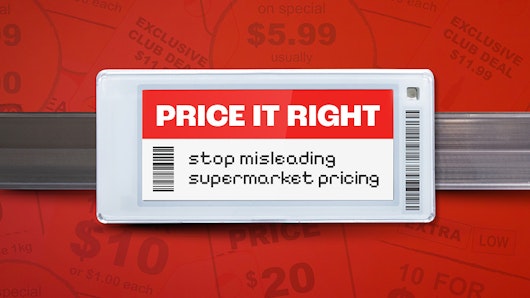
Make supermarkets price it right
Find out about our campaign to tell the government we need clear rules, stronger penalties and automatic compensation for shoppers.
